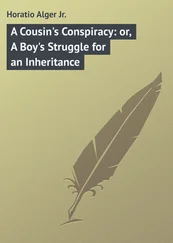Horatio Alger - The Telegraph Boy
Здесь есть возможность читать онлайн «Horatio Alger - The Telegraph Boy» — ознакомительный отрывок электронной книги совершенно бесплатно, а после прочтения отрывка купить полную версию. В некоторых случаях можно слушать аудио, скачать через торрент в формате fb2 и присутствует краткое содержание. Жанр: foreign_children, literature_19, foreign_antique, foreign_prose, на английском языке. Описание произведения, (предисловие) а так же отзывы посетителей доступны на портале библиотеки ЛибКат.
- Название:The Telegraph Boy
- Автор:
- Жанр:
- Год:неизвестен
- ISBN:нет данных
- Рейтинг книги:3 / 5. Голосов: 1
-
Избранное:Добавить в избранное
- Отзывы:
-
Ваша оценка:
- 60
- 1
- 2
- 3
- 4
- 5
The Telegraph Boy: краткое содержание, описание и аннотация
Предлагаем к чтению аннотацию, описание, краткое содержание или предисловие (зависит от того, что написал сам автор книги «The Telegraph Boy»). Если вы не нашли необходимую информацию о книге — напишите в комментариях, мы постараемся отыскать её.
The Telegraph Boy — читать онлайн ознакомительный отрывок
Ниже представлен текст книги, разбитый по страницам. Система сохранения места последней прочитанной страницы, позволяет с удобством читать онлайн бесплатно книгу «The Telegraph Boy», без необходимости каждый раз заново искать на чём Вы остановились. Поставьте закладку, и сможете в любой момент перейти на страницу, на которой закончили чтение.
Интервал:
Закладка:
"Charity for a poor blind man!" whined Mills, in the tone of a professional beggar.
"Look here, old fellow, you come in here too often," said a young salesman. "I gave you five cents yesterday."
"I didn't know it," said Mills. "I am a poor blind man. All places are alike to me."
"Then your boy should know better. Nothing for you to-day."
Frank and his companion left the store.
In the next they were more fortunate. A nickel was bestowed upon the blind mendicant.
"How much is it?" asked Mills, when they were on the sidewalk.
"Five cents, sir."
"That's better than nothing, but we ought to do better. It takes a good many five-cent pieces to make a dollar. When you see a well-dressed lady coming along, tell me."
Frank felt almost as much ashamed as if he were himself begging, but he must do what was expected of him. Accordingly he very soon notified the blind man that a lady was close at hand.
"Lead me up to her, and say, Can you spare something for my poor, blind uncle?"
Frank complied in part, but instead of "poor, blind uncle" he said "poor, blind man." Mills scowled, as he found himself disobeyed.
"How long has he been blind?" asked the lady, sympathetically.
"For many years," whined Mills.
"Is this your boy?"
"Yes, ma'am; he is my young nephew, from the country."
"You are fortunate in having him to go about with you."
"Yes, ma'am; I don't know what I should do without him."
"Here is something for you, my good man," said the lady, and passed on.
"Thank you, ma'am. May Heaven bless you!"
"How much is it?" he asked quickly, when the lady was out of hearing.
"Two cents," answered Frank, suppressing with difficulty an inclination to laugh.
"The mean jade! I should like to wring her neck!" muttered Mills. "I thought it was a quarter, at least."
In the next store they did not meet a cordial reception.
"Clear out, you old humbug!" shouted the proprietor, who was in ill-humor. "You ought to be put in the penitentiary for begging about the streets."
"I pray to God that you may become blind yourself," said Mills, passionately.
"Out of my store, or I'll have you arrested, both of you!" said the angry tradesman. "Here, you boy, don't you bring that old fraud in this store again, if you know what's best for yourself."
There was nothing to do but to comply with this peremptory order.
"He's a beast!" snarled Mills; "I'd like to put his eyes out myself."
"You haven't got a very amiable temper," thought Frank. "I wouldn't like to be blind; but even if I were, I would try to be pleasanter."
Two young girls, passing by, noticed the blind man. They were soft-hearted, and stopped to inquire how long he had been blind.
"Before you were born, my pretty maid," said Mills, sighing.
"I have an aunt who is blind," said one of the girls; "but she is not poor, like you."
"I am very poor," whined Mills; "I have not money enough to pay my rent, and I may be turned out into the street."
"How sad!" said the young girl, in a tone of deep sympathy. "I have not much money, but I will give you all I have."
"May God bless you, and spare your eyes!" said Mills, as he closed his hand upon the money.
"How much is it?" he asked as before, when they had passed on.
"Twenty-five cents," said Frank.
"That is better," said Mills, in a tone of satisfaction.
For some time afterwards all applications were refused; in some cases, roughly.
"Why don't you work?" asked one man, bluntly.
"What can I do?" asked Mills.
"That's your lookout. Some blind men work. I suppose you would rather get your living by begging."
"I would work my fingers to the bone if I could only see," whined Mills.
"So you say; but I don't believe it. At any rate, that boy of yours can see. Why don't you set him to work?"
"He has to take care of me."
"I would work if I could get anything to do," said Frank.
As he spoke, he felt his hand pressed forcibly by his companion, who did not relish his answer.
"I cannot spare him," he whined. "He has to do everything for me."
When they were again in the street, Mills demanded, roughly, "What did you mean by saying that?"
"What, sir?"
"That you wanted to go to work."
"Because it is true."
"You are at work; you are working for me," said Mills.
"I would rather work in a store, or an office, or sell papers."
"That wouldn't do me any good. Don't speak in that way again."
The two were out about a couple of hours, and very tiresome Frank found it. Then Mills indicated a desire to go home, and they went back to the room in the old tenement-house. Mills threw himself down on the bed in the corner, and heaved a sigh of relief.
"Now, boy, count the money we have collected," he said.
"There's ninety-three cents," Frank announced.
"If I had known it was so near a dollar we would have stayed a little longer. Now, get me my pipe."
"Where is it, sir?"
"In the cupboard. Fill it with tobacco, and light it."
"Are you not afraid of setting the bedding on fire, sir?"
"Mind your own business. If I choose to set it on fire, I will," snarled Mills.
"Very well, sir; I thought I'd mention it."
"You have mentioned it, and you needn't do it again."
"What a sweet temper you've got!" thought Frank.
He sat down on a broken chair, and, having nothing else to do, watched his employer. "He looks very much as if he could see," thought Frank; for Mills now had his eyes wide open.
"What are you staring at me for, boy?" demanded his employer, rather unexpectedly.
"What makes you think I am staring at you, sir?" was Frank's natural question. "I thought you couldn't see."
"No more I can, but I can tell when one is staring at me. It makes me creep all over."
"Then I'll look somewhere else."
"Would you like to do some work, as you said?"
"Yes, sir."
"Then take twenty-five cents, and buy some evening papers and sell them; but mind you bring the money to me."
"Yes, sir," said Frank, with alacrity.
Anything he thought would be better than sitting in that dull room with so disagreeable a companion.
"Mind you don't run off with the money," said the blind man, sharply. "If you do I'll have you put in the Tombs."
"I don't mean to run away with the money," retorted Frank, indignantly.
"And when you've sold the papers, come home."
"Yes, sir."
With a feeling of relief, Frank descended the stairs and directed his steps to the Park, meaning to ask Dick Rafferty's advice about the proper way to start in business as a newsboy.
CHAPTER V.
FRANK THROWS UP HIS SITUATION
Frank found his friend on Park Row, and made known his errand.
"So old Mills wants you to sell papers for his benefit, does he?"
"Yes, but I'd rather do it than to stay with him."
"How much has he agreed to pay you?"
"That isn't settled yet."
"You'd better bring him to the point, or he won't pay you anything except board and lodging, and mighty mean both of them will be."
"I won't say anything about it the first day," said Frank. "What papers shall I buy?"
"It's rather late. You'd better try for Telegrams."
Frank did so, and succeeded in selling half a dozen, yielding a profit of six cents. It was not a brilliant beginning, but he was late in the field, and most had purchased their evening papers. His papers sold, Frank went home and announced the result.
"Umph!" muttered the blind man. "Give me the money."
"Here it is, sir."
"Have you given me all?" sharply demanded Mills.
"Of course I have," said Frank, indignantly.
"Don't you be impudent, or I will give you a flogging," said the blind man, roughly.
Читать дальшеИнтервал:
Закладка:
Похожие книги на «The Telegraph Boy»
Представляем Вашему вниманию похожие книги на «The Telegraph Boy» списком для выбора. Мы отобрали схожую по названию и смыслу литературу в надежде предоставить читателям больше вариантов отыскать новые, интересные, ещё непрочитанные произведения.
Обсуждение, отзывы о книге «The Telegraph Boy» и просто собственные мнения читателей. Оставьте ваши комментарии, напишите, что Вы думаете о произведении, его смысле или главных героях. Укажите что конкретно понравилось, а что нет, и почему Вы так считаете.












